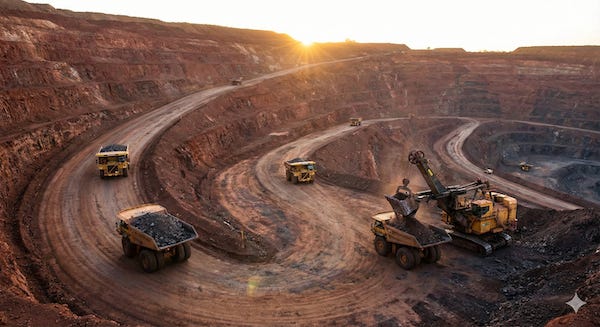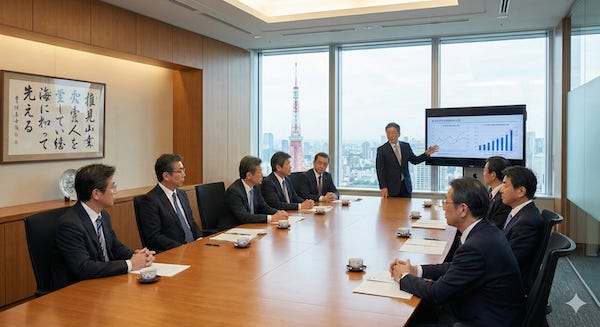Mitsubishi spent $1 billion buying fish farms.
The farms were located in Norway and Canada. They were farming salmon fish.
The Japanese company felt that the global demand for protein was increasing.
Grieg Seafood, the Norwegian company, was the owner of these farms.
The company will become the world’s 2nd largest producer of salmon fish by 2027.
Salmon fish is a source of protein with one of the lowest carbon footprints when compared to chicken, lamb, pork, etc.
You might have heard of Mitsubishi as a car manufacturer — Lancer, Pajero, etc. Or, you might have noticed the Mitsubishi logo on air conditioners and elevators.
Why is this company buying a fish farm?
Mitsubishi is a “sogo shosha”. Translated from Japanese, this roughly means ‘general trading house’.
These companies do not do one thing. They own multiple businesses.
Japanese general trading houses have become a talking point in recent months. One of the biggest reasons for this is Warren Buffett and his stake in these trading companies.
Sogo Shosha
In Japan, working in a general trading company is associated with great respect. These jobs pay extremely well.
But they are infamously demanding.
Students from top-universities compete for these posts.
Jobs often require people to travel and stay across the world. Often, without family.
They are generalist roles where the ability to make a deal is highly prized. Naturally, inter-personal skills are of utmost importance.
A lot of these demands stem from the nature of these shosha companies.
Japanese general trading companies tend to invest in practically everything.
They are conglomerates. They may not always take operational control of companies. But many times, they do.
To understand their nature better, it might help to look at some of their products and the industries they operate in.
Mitsubishi Corporation & Others
This conglomerate today operates in many verticals — heavy machinery, defense vehicles, transport vehicles, motor vehicles, ships, and more.
Their metals vertical has interests in mining, coal, coke, copper, iron, aluminum, and even uranium.
Similarly, each vertical like chemicals, infrastructure, energy, finance — all have a host of products operating under them. This conglomerate even has an IT arm.
All in all, this Mitsubishi Corporation has a presence in over 120 companies under its umbrella with a total of over 60,000 employees.
Its market cap as of writing this is over $86 billion.
This makes Mitsubishi Corporation the biggest Japanese general trading house.
ITOCHU, with a market cap of around $80 billion is second in line. It too has interests ranging from food, energy, textile, machinery, metals, minerals, etc.
After that is Mitsui — with a market cap of around $75 billion. Again, similar sectors – energy, minerals, lifestyle, metal, chemicals, etc.
Then there’s Marubeni with an m-cap of around $40 billion. Then there’s Sumitomo at around $35 billion.
All of these trading companies trace their origins back to the late 1800s or early 1900s. They’ve played a big role in Japan’s economy and post World War 2 re-development.
They have an extremely diverse set of businesses that operate in very diverse geographies.
Warren Buffett Angle
And there’s one more commonality among these 5 conglomerates. Warren Buffett has invested in them.
The view is to hold these companies for at least 50 years or forever.
Over the years, Warren Buffett has become extremely cautious about investing in shares. His worry has been mostly centered around valuations.
This has been illustrated well by the amount of money he holds in the form of cash — over $381 billion.
In 2020, Warren Buffett via Berkshire Hathaway announced that he had started to buy stakes in the top 5 Japanese trading companies or shoshas.
At the time of that announcement, he held close to 5% of their stakes.
In the 5 years since, this stake has been increased to almost 10%.
In his letter to shareholders in 2025, Warren Buffett mentioned that these trading companies operated a lot like mini Berkshire Hathaways.
They are well diversified across industries. They have access to a large customer base owing to their global exposure.
Their cash flows and margins are healthy and the dividend growth looks promising.
What was even more tempting to Warren is the valuation. These stocks are “cheap”. Their PE ratio was more or less under 10 when Warren started buying them.
To give you some idea, the Nifty 50’s PE ratio right now is about 21.
That’s still an index of 50 companies. If you look at individual stocks that are a part of Nifty 50, PE ratio in the range of 30-80 can be found. Some even higher.
In the USA, the PE ratio of the S&P 500 is about 30. The PE ratio of individual stocks in S&P 500 can be found to be that much higher too.
If that was not already tempting, these stocks’ dividend yields are in the range of 2-4%.
Japanese loans are also extremely cheap. 0.5% interest rate.
Buffett has used these cheap loans to buy Japanese stocks that give high dividends.
These investments have attracted the attention of many global investors. Following his first announcement back in 2020, many Japanese and foreign investors started pumping in money into these stocks.
That alone led to 5-10% jumps in the share prices of these stocks.
Warren Buffett does not pay much attention to such swings, of course.
The valuations were still cheap.
He continued putting more money into the stocks.
In his last letter to shareholders, he has expressed that his interest in the Japanese stock markets continues.
Quick Takes
+ India’s merchandise exports fell 11.8% year-on-year in Oct, while imports rose 16.63%. Trade deficit rose to $41.68 billion (vs $32.15 billion in Sept).
+ India’s unemployment remained unchanged at 5.2% in Oct.
+ India’s passenger vehicle sales grew 17.2% year-on-year to 4.61 lakh units in Oct: SIAM
+ RBI announced relief for exporters hurt by US tariffs. It allowed banks and NBFCs to offer a moratorium (temporary pause on loan repayments), extend export credit and give exporters more time to bring back export proceeds.
+ The central government launched the Trade Intelligence and Analytics (TIA) portal to give businesses better access to trade data.
+ India’s infrastructure output remained unchanged in the month of Oct. Fertilisers, steel, petroleum refinery products and cement sectors recorded growth, while coal, natural gas, electricity and crude oil are the sectors that declined.
+ The US approved 2 arms sales worth $92.8 million to India, including Excalibur precision projectiles and Javelin anti-tank missile systems.
+ India’s composite PMI (manufacturing + services) fell to 59.9 in Nov (vs in 60.4 Oct). Manufacturing PMI fell to 57.4 (vs 59.2 in Oct). Services PMI rose to 59.5 (vs 58.9 in Oct): according to preliminary estimates. This means economic activity grew less in Nov than in Oct.
+ India’s forex reserves rose by $5.54 billion to $692.58 billion in the week that ended on 14 Nov.
+ India and Israel signed the Terms of Reference to formally begin negotiations for a Free Trade Agreement (FTA).
+ PhysicsWallah IPO listed on the stock exchanges at a premium of 33.03% over the issue price and closed 42.42% up at the end of the day.
+ Tenneco Clean Air IPO listed on the stock exchanges at a premium of 27.20% over the issue price and closed 23.63% up at the end of the day.
+ Emmvee Photovoltaic IPO listed flat on the stock exchanges and closed 1.11% up at the end of the day.
+ Fujiyama Power IPO listed on the stock exchanges at a discount of 3.51% on the issue price and closed 8.58% down at the end of the day.
+ Capillary Technologies IPO listed on the stock exchanges at a discount of 0.88% on the issue price and closed 5.11% up at the end of the day.
The information contained in this Groww Digest is purely for knowledge. This Groww Digest does not contain any recommendations or advice.
Team Groww Digest




